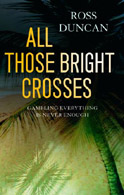 | Ross Duncan ALL THOSE BRIGHT CROSSES Vintage, 335 pp. Source: review copy Review by Perry Middlemiss |
The best thrillers take us on a roller-coaster ride, forcing us to keep turning the pages as the frenetic pace doesn't let up. Literary fiction tends towards the other end of the scale: a slow, introspective journey across a sedate landscape, where everything can be weighed and balanced, inspected and examined. To find a novel that seems to neatly fit between the two, to take some of the best from each genre, is a real treat. All Those Bright Crosses is one of those rare beasts.
Martin Flint is in a bad way. He begins the novel sitting in a dingy bar in Fiji, drinking too much and longing for better days. A long-dormant gambling compulsion has reared up and swallowed him after the death of his young daughter in a drowning accident in his backyard swimming pool. His wife has left him, he's in debt up to his eyeballs, and he's lost his job as sub-editor on a major newspaper.
On the day Cali died Angelica had gone to work. I was at home. When I went out into the backyard to check on Cali, she was not there. Not in the yard or the street or at any of neighbours' places.The only thing that seems to spark any sense of interest in him is a long-forgotten story of lost shipwreck treasure on an island somewhere near Fiji. So he throws in his past life, travels to Fiji on the back of a small inheritance to carry on some extra research into the mystery and finds that the tropical life suits his current mood. Suits it to the extent that he settles into a quiet existence, working part-time for the hotel where he lives and filling in at a local paper. The trouble is he starts to think he might just be trading in a gambling addiction for something else.I thought about this as I stood out on the balcony of the aprtment the night that Angelica left, chainsmoking and watching an argument in the street between a couple of junkies. I told myself then that it wasn't my gambling that had made Angelica pack her bags. In the brutal glare and sudden hush of that moment, when Cali's body was raised from the floor of our swimming pool, something between Angelica and me severed, something we thought we might be able to live without. Because it was impossible to restore.
There was no breeze now, the sky was cloudless and the sun seared into me. A mix of angst and longing, something like homesickness gripped me, and I had an urge to tell Rusty to turn back. But I resisted. I wondered, as I clambered out of the boat, if I had become like one of those men who never quite finishes restoring the vintage car, who pleads in his defence the need for thoroughness, authenticity, perfection, when the truth is he has no idea what he would do with himself if he ever managed to complete the project. It is really just a way of killing time, filling up the emptiness. Looking for treasure. It was the reason I had come to Fiji but it wasn't the real reason I lingered here. That was something I still barely understood. Or perhaps was simply too painful to acknowledge.Taken simply like that, the novel sounds about as boring as it could possibly get. And yet Duncan never allows Flint to get too maudlin, or too introspective. He keeps the mystery of the shipwreck ticking along - mainly in the background, but also occasionally right up front - to maintain a sense of mystery that keeps the reader turning the pages. And all the while a steady change comes over Flint: he starts to become less self-obsessed, more interested in the people who cross his path and more able to reconcile himself to the nagging suspicion that it was really him who was responsible for his daughter's death.
For a long while during the reading of this novel I had the suspicion that Duncan was going to morph the plot into a full-blown treasure hunt. There is some of that -- a mystery con-man from the past, stolen research papers and serious threats of violence -- but the main thrust of the book is Flint's journey towards an inner sense of peace as he comes to terms with himself and what has happened in his life.
On the evidence of this debut novel, Ross Duncan could follow either the thriller or literary paths in his fiction. I expect he would succeed with either.
